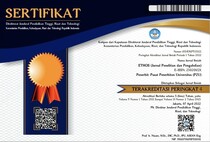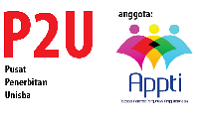Program SANATA (Sayang Anak Balita) di Wilayah Posyandu RW 08 Srondol Kulon
Abstract
Abstract. Prevalence of malnutrition among under five years old children still high. Results of nutrition problem analyzed among under five years old children at RT 01, 02, and 03 RW 08 Srondol, Semarang City showed that overweight and stunting proportions among under five years old children were still high. This community nutrition program had objective to optimized Integrated service post (POSYANDU) function to monitor growth and development of under-five years old children (D/S ) with contribution of stakeholder, increasing maternal knowledge about complementary feeding and feeding practice for children, increasing feeding practice for under-five children, and increasing nutritional status (W/H) of under-five years old children. These community service programs were being held in December 2018 with community relation methods. This program involved stakeholders, POSYANDU cadre, and mother of overweight and stunting children at RW 08 Srondol Kulon, Banyumanik District, Semarang City. The result of “SANATA: sayang anak balita” includes : 1) there was the participation of local government for programs, increasing of POSYANDU participation (D/S) from 32,5% - 37,1%. There was an increased in mother knowledge and feeding practice. Nutritional intake of under five years old children increased and get 80-110% sufficiency for macronutrient. None children had decreased on W/H nutritional status and increasing of nutritional status (W/H) occur on 5 from 10 stunting children. We hoped that there was a sustainability of the program with knowledge updating for mothers. Reward from RW/posyandu for mother with normal nutritional status of children, haved good nutritional knowledge, and had the capability to child feeding practice would give support from them to optimized nutritional status.
Keywords: nutritional status, overweight, stunting, improving nutrition
Abstrak. Prevalensi masalah gizi buruk, gizi kurang, stunting, dan gizi lebih pada balita masih cukup tinggi. Hasil analisis masalah gizi pada balita di RT 01, 02, dan 03 RW 08 Srondol, Kota Semarang yaitu masih tingginya proporsi status gizi lebih dan status gizi pendek (stunting) pada balita. Program pengabdian kepada masyarakat ini bertujuan untuk mengoptimalkan fungsi posyandu dalam pemantauan tumbuh kembang anak (cakupan D/S) dengan melibatkan stakeholder terkait, meningkatkan pengetahuan ibu tentang MP-ASI dan pemberian makan pada balita, meningkatkan pola asuh ibu balita dalam pemberian makan balita sesuai kebutuhan, dan meningkatkan status gizi BB/TB pada balita. Program pengabdian kepada masyarakat ini dilaksanakan pada bulan Desember Tahun 2018 dengan metode community relation. Program melibatkan tokoh masyarakat, kader posyandu, dan ibu balita berstatus gizi lebih dan gizi pendek di wilayah RT 01, 02 dan 03 RW 08 Kelurahan Srondol Kulon Kecamatan Banyumanik, Kota Semarang. Hasil dari program SANATA: sayang anak balita ini adalah adanya partisipasi tokoh masyarakat dalam program, meningkatnya angka partisipasi posyandu (cakupan D/S) di Posyandu Mawar RW 08 yaitu dari 32,5 % menjadi 37,1 %. Terdapat peningkatan pengetahuan ibu tentang MP-ASI dan pemberian makan pada balita. Asupan zat gizi pada balita yang dilihat dari perubahan pola makan balita dapat mencapai kecukupan 80-110% zat gizi makro. Tidak terjadi penurunan status gizi BB/TB (pada 10 balita) dan terjadi peningkatan status gizi BB/TB pada 5 dari 10 balita stunting. Diharapkan adanya upaya menjaga keberlanjutan program dengan pengkayaan materi (update pengetahuan) pada ibu balita secara berkala. Penghargaan/reward/apresiasi dari pihak RW/posyandu bagi ibu yang memiliki balita berstatus gizi baik, memiliki pengetahuan gizi yang baik, serta mampu melaksanakan pola pengasuhan dan pemberian makan yang baik bagi balita akan lebih menyemangati para ibu balita dalam mengoptimalkan gizi balitanya.
Kata Kunci: gizi balita, gizi lebih, stunting, perbaikan gizi
Keywords
Full Text:
PDFReferences
Abeway S, Gebremichael B, Murugan R, Assefa M & Adinew YM, 2018. Stunting and its determinants among children aged 6-59 Months in Northern Ethiopia: A cross-sectional study. Journal of Nutrition and Metabolism, 2018.
Asosiasi Dietisien Indonesia (ASDI), Ikatan Dokter Anak Indonesia (IDAI) & Persatuan Ahli Gizi Indonesia (PERSAGI), 2014. Penuntun diet anak. 3rd ed., Badan Penerbit FKUI.
Bhutta ZA, Ahmed T, Black RE, Cousens S, Dewey K, Giugliani E, et al., 2008. What works ? Interventions for maternal and child undernutrition and survival. The Lancet, 371, pp.471–440.
Dewi M & Aminah M, 2016. Pengaruh Edukasi Gizi terhadap Feeding Practice Ibu Balita Stunting Usia 6-24 Bulan (The Effect of Nutritional Knowledge on Feeding Practice of Mothers Having Stunting Toddler Aged 6-24 Months). Indonesian Journal of Human Nutrition, 3(1), pp.1–8.
Dewi R & Anisa R, 2018. The Influence of Posyandu Cadres Credibility on Community Participation in Health Program Pengaruh Kredibilitas Kader Posyandu terhadap Partisipasi Masyarakat pada Program Kesehatan. The Messenger, 10(1), pp.83–92.
Kementerian kesehatan, 2011. Pedoman Umum Pengelolaan posyandu,
Kementerian Kesehatan, 2018. Riset Kesehatan Dasar 2018.
Kosasih C., W R & T S, 2012. The empowering of cadres and the family mentoring in preventing nutrition disorders at pakuwon village and sindangsari sub-district, cisurupan regency, garut. Jurnal Aplikasi Ipteks untuk Masyarakat, 1(1), pp.6–12.
Lee J, Houser RF, Must A, De Fulladolsa PP & Bermudez OI, 2012. Socioeconomic disparities and the familial coexistence of child stunting and maternal overweight in guatemala. Economics and Human Biology, 10(3), pp.232–241. Available at: http://dx.doi.org/10.1016/j.ehb.2011.08.002.
Schrijner S & Smits J, 2018. Grandparents and Children’s stunting in sub-Saharan Africa. Social Science and Medicine, 205(October 2017), pp.90–98. Available at: https://doi.org/10.1016/j.socscimed.2018.03.037.
Semba RD, de Pee S, Sun K, Sari M, Akhter N & Bloem MW, 2008. Effect of parental formal education on risk of child stunting in Indonesia and Bangladesh: a cross-sectional study. The Lancet, 371(9609), pp.322–328.
Siagian CM & Halisitijayani M, 2015. Mother’s Knowledge On Balanced Nutrition to Nutritional Status of Children in Puskesmas (Public Health Center) In the District of Pancoran, Southern Jakarta 2014. International Journal of Current Microbiology and Applied Studies, 4(7), pp.815–826.
Tumilowicz A, Beal T & Neufeld LM, 2018. A review of child stunting determinants in Indonesia. , (March), pp.1–10.
UNICEF, WHO & World Bank, 2018. LEVELS AND TRENDS IN CHILD MALNUTRITION,
Yabancı N, Kısaç İ & Karakuş SŞ, 2014. The Effects of Mother’s Nutritional Knowledge on Attitudes and Behaviors of Children about Nutrition. Procedia - Social and Behavioral Sciences, 116, pp.4477–4481.
DOI: https://doi.org/10.29313/ethos.v8i2.5449
Refbacks
- There are currently no refbacks.
Alamat Redaksi:
LPPM Unisba, Lantai 2, Jl. Purnawarman 63, Bandung 40116, Jawa Barat, (022) 4203368 , (022) 4264064. ethos.unisba@gmail.com / ethos@unisba.ac.id

This work is licensed under a Creative Commons Attribution-NonCommercial-ShareAlike 4.0 International License.














